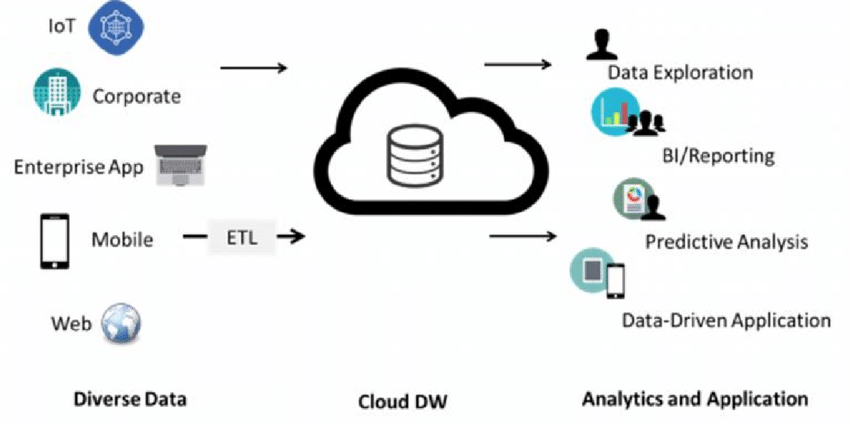Cloud data warehouse technology has evolved to accommodate the growing data volumes while allowing easy and seamless scaling of resources depending on requirements.
Today, businesses are collecting and accumulating large amounts of data. To remain competitive, they should quickly and efficiently analyze the information to gain valuable insights and make better data-driven decisions. However, processing the ever-increasing amounts of data requires significant financial investments to build, maintain and regularly upgrade an on-premise data warehouse. And this is a challenge for small businesses or those with inadequate computational and storage capacities.
On the other hand, the cloud data warehouse offers a flexible, scalable, and easy-to-use platform that all sizes of businesses can afford. The cost-effective service provides faster analysis and more straightforward access to reports. Additionally, authorized users, including those outside the company network, can access the analysis reports from any geographical region.
What is a cloud data warehouse?
A cloud data warehouse is a centralized data repository offered as a managed service on the private, public, or hybrid cloud. Leveraging the benefits of the cloud, such as scalability, unlimited computational power, and flexibility, it enables businesses of all sizes to efficiently store and analyze large amounts of data at lower costs.
A traditional data warehouse requires a lot of time and money to deploy, configure, manage, and maintain. On the other hand, the cloud counterpart takes only a few minutes to upgrade resources while the service provider does the management and maintenance at a lower cost.
Ideally, the cloud-based data warehouse provides unlimited and cost-effective storage and computational power to quickly and efficiently analyze massive volumes of data without high financial commitments.
Besides enabling businesses to meet today’s data storage and analysis needs, it future-proofs them by supporting easy and instant scaling up or down. Most providers offer the service on affordable pay-as-you-go pricing plans. And this allows companies to seamlessly and quickly scale up or down to meet changing business requirements and budgets.
Combining the Pay-As-You-Go pricing model with elastic scaling automates increasing or reducing the resources based on real-time needs. For example, during resource-intensive processes, such as ETL, the system increases the data storage and compute power for the short duration the analysis is running. Once complete, it scales down to ensure the business does not pay for idle resources.

Why the CDWH important for your business
If you are overwhelmed by the large amounts of data that you cannot analyze due to limited resources such as storage and computational power, a cloud warehouse is for you. Some benefits that make it more attractive to businesses include ease of deployment and use, reduced overall cost, instant scaling up or down, reliability, unlimited capacity, and processing power.
Also, some providers offer the warehouse service with elastic scaling that further reduces the costs since this will downgrade the services, such as processing power, when no one is processing data. For example, when running, activities such as ETL consume a lot of storage and processing. However, the requirements are much lower when idle. With elastic scaling, the resources are automatically reduced to suit the requirements in real-time, hence saving money for the businesses, since they only pay for what they are using.
Additionally, the cloud DWH is flexible, and reliable and supports different data types, sources, and use cases in addition to being secure for regulated industries.
Why a CDWH is better than an on-premise data warehouse
A cloud or on-premise data warehouse may be ideal for your business depending on the industry, budget, regulations, and compliance issues. However, building and maintaining an on-premise data warehouse is more costly in terms of financial requirements, upgrades to meet growing data volumes, maintenance, and more.
Upgrading an on-premise data warehouse would take longer while the cloud counterpart is almost instant. Also, once you invest in a large capacity in the on-premise platform, you keep maintaining the system, including the idle resources, since you cannot easily scale it down.